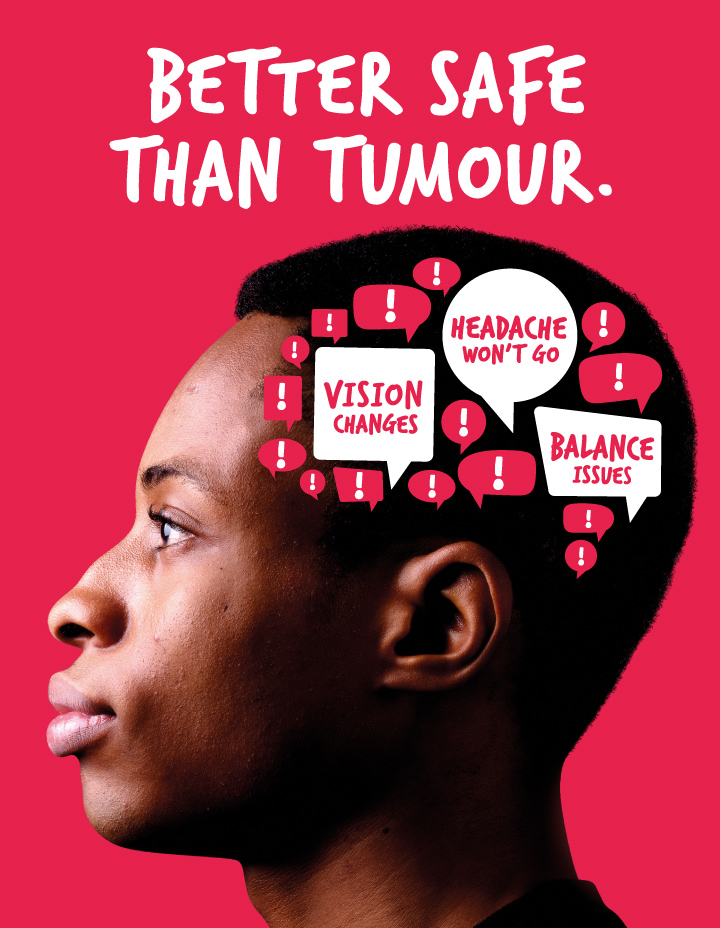Nausea and dizziness
The three most common symptoms of brain tumours are headaches, changes to vision and nausea (feeling sick) or vomiting (being sick).

Short summary
A brain tumour might create feelings of nausea and dizziness. This could be because of the tumour increasing pressure in the skull as it grows. Or it could be growing in an area of the brain that affects nausea.
But, it’s important to remember that brain tumours are relatively rare. This means that in most cases your nausea or vomiting will NOT be due to a brain tumour.
On this page, we’ll discuss:
- Do brain tumours cause nausea?
- What sort of nausea or vomiting do brain tumours cause?
- How do I cope with nausea and vomiting?
Other symptoms
Use our Better Safe Than Tumour symptom checker to check for other brain tumour symptoms.
Talking to your doctor
Learn more about how to approach your GP.
Get your free Information Pack
Our Brain Tumour Information Pack can help you better understand your diagnosis and feel confident talking to your medical team.
Do brain tumours cause nausea (make you feel sick)?
Brain tumours can make you feel sick, and feeling nauseous is one of the common symptoms, but it’s rare for nausea to be the only symptom of a brain tumour.
Feeling or being sick is also common in healthy people and can be due to many everyday causes, such as:
- food poisoning
- drinking too much alcohol
- dehydration
- flu
- pregnancy.
However, brain tumours can make you feel sick, either because they cause increased pressure in the skull, or because of where they are in the brain.
Increased pressure in the skull
When a tumour grows inside the fixed space of the skull, it can press on the brain tissue or block the flow of the fluid within the brain. In both cases, this can lead to increased pressure inside the skull, called raised intracranial pressure (ICP). The effect of this is nausea, vomiting and headaches.
Position within the brain
Each area of the brain controls different functions, so a tumour in any area of the brain may prevent that part from working properly. If a tumour is in an area of the brain that helps to control balance, it can make you feel dizzy, which in turn can make you feel sick.
Other areas where a brain tumour can cause this effect, include those involved in vision and movement of the eyes (giving you double vision), or an area that affects your hormone levels, making them imbalanced.
Such areas of the brain include the cerebellum, the brain stem, the meninges, and areas around the nerves from the ear or near the pituitary gland. (Of course, a brain tumour in any area can cause nausea due to increased pressure in the skull.)
What sort of nausea or vomiting do brain tumours cause?
Nausea (or vomiting) is rarely the only symptom of a brain tumour.
Nausea or vomiting associated with a brain tumour:
- may be worse in the mornings and get better during the day as the tumour may cause a build-up of pressure in the skull overnight, but this begins to drain during the day when you are in an upright position
- may get worse if you suddenly change position, e.g. from sitting or lying to standing
- may continue for more than a week, on most days, with no sign of getting better
- may be accompanied by hiccups
- are unrelated to other conditions
- are usually accompanied by other common brain tumour symptoms, such as a headache or a change in vision.
How do I cope with nausea and vomiting caused by a brain tumour?
If you’re diagnosed with a brain tumour, you may have ongoing nausea and vomiting due to the effects of your tumour, or as a side-effect of treatments, such as chemotherapy or radiotherapy.
You may be given anti-sickness tablets (known as anti-emetics) but you should tell your healthcare team straight away if they become less effective.
There are changes to your diet that can help manage and treat nausea and vomiting. Or, you could try the following suggestions:
- If you have been prescribed steroids, make sure you take them – they can help reduce any swelling/increased pressure in the brain that may be causing the nausea
- Avoid strong smells, for example paint, onions or garlic
- Some people have found acupuncture helps
- If you feel like vomiting, breathe deeply and slowly, or get some fresh air
- Distract yourself by listening to music, watching a film/TV show or chatting with friends
I think I have a brain tumour, what should I do?
Brain tumours are rare. But, if you’re worried and you have a symptom that won’t go away, or if you have more than one symptom of a brain tumour, then:
- Talk to your doctor
GP appointments are usually quite short, so make sure you find out how to best prepare for your appointment. - Get an eye test
If your symptoms are limited to changes in vision and/or headaches, get your eyes tested by an optician before seeing your GP. - Go to A&E
If the symptoms are sudden or severe, you should go to your emergency department or call 999.
In this section

Know the Signs and Symptoms
Although brain tumours are rare, if you or a loved one are experiencing two or more of the signs and symptoms it’s important that you speak to your doctor to rule out a brain tumour.

We want to hear from you!
Help us shape our services to better support you.
We’re especially keen to hear from those we don’t often connect with, like carers, people from minoritised ethnic backgrounds, and people from low-income households.
We’re offering a £25 Amazon voucher for those who take part.